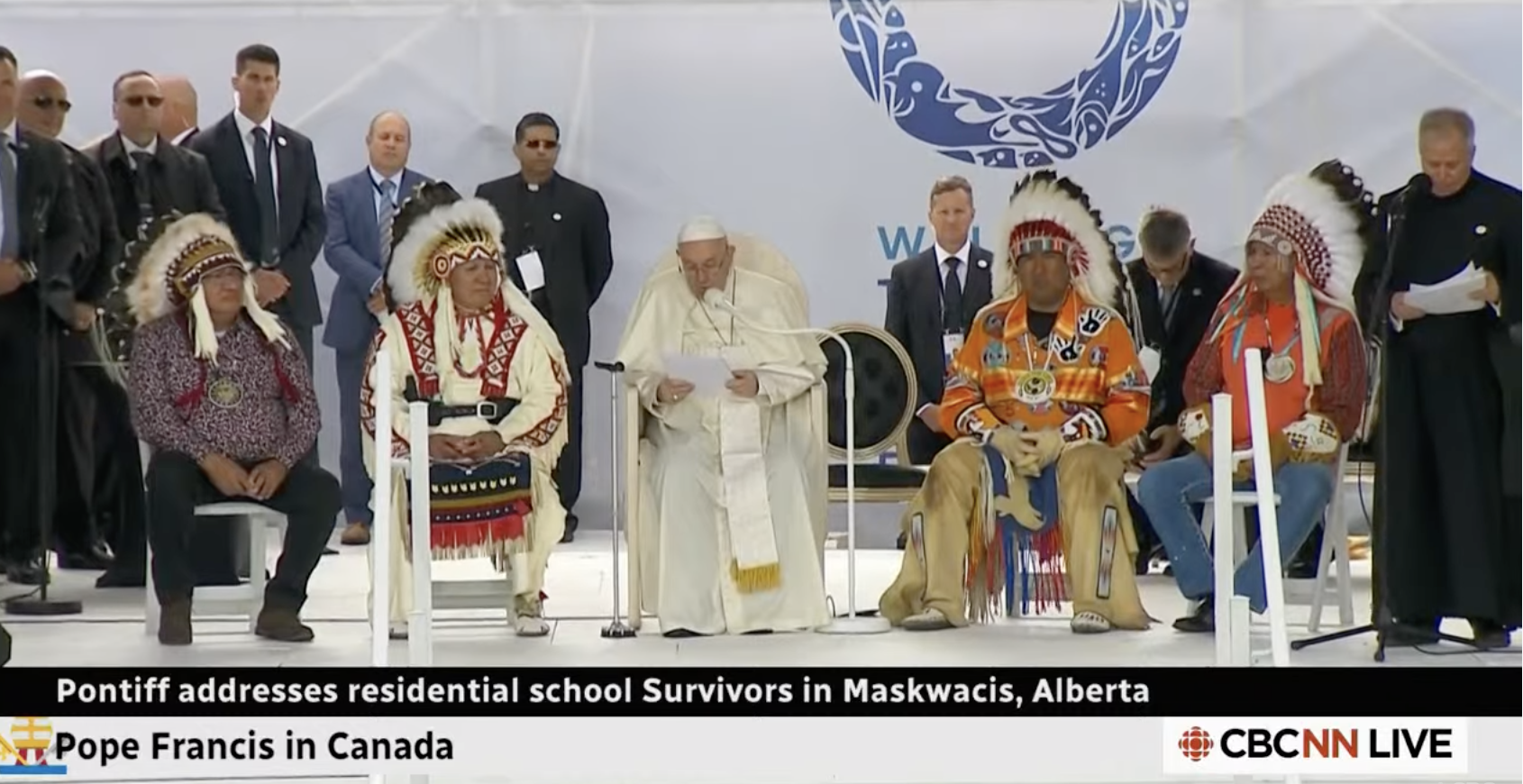
- Details
- By Kaili Berg
Pope Francis passed away on Monday, April 21 following a stroke that led to heart failure. His death occurred at his residence in the Vatican's Casa Santa Marta. Pope Francis was 88.
As the first Latin American and Jesuit pope, Francis's tenure was marked by efforts to address the Catholic Church's historical wrongs against Indigenous peoples in North America.
His most widely recognized moment in Indian Country came in 2022, when Pope Francis traveled to Canada and issued a formal apology to First Nations, Inuit, and Métis survivors for the Catholic Church’s role in operating residential schools.
These institutions, run for over a century, aimed to forcibly assimilate Indigenous children. As in Indian boarding schools in the United States, in Canada First Nation students were often subjected to physical, emotional, and sexual abuse, as well as cultural erasure.
“I humbly beg forgiveness for the evil committed by so many Christians against the Indigenous peoples,” Pope Francis said during a speech at Maskwacis, Alberta, where a residential school once stood. “I also feel shame … sorrow and shame for the role that a number of Catholics, particularly those with educational responsibilities, have had in all these things that wounded you.”
The apology followed years of advocacy by Indigenous leaders and survivors. While many welcomed it as a long-overdue acknowledgment, others criticized the Vatican for not going far enough.
Some pointed out that Pope Francis never used the word "genocide," and that no direct commitments were made to provide reparations or return church-held records and artifacts. During his visit to Quebec, many who traveled long distances said they were not given a chance to speak or share their stories directly with him.
Prot to the ponfiff's trip to Canada, Deborah Parker (Tulalip Tribes), CEO of the National Native American Boarding School Healing Coalition responded to the apology by saying: “The Catholic Church must also abide by the requests of the delegates, including Pope Francis going to Canada to apologize to survivors and their families, the repatriation of artifacts in the collections of Vatican museums, and opening the Vatican archives for researchers to search for records related to residential schools.”
In 2023, another major development came when Pope Francis formally repudiated the Doctrine of Discovery, an ideology rooted in 15th-century papal bulls that was used to justify European colonization of Indigenous lands.
For centuries, this doctrine was cited to legitimize the seizure of Native territories across the Americas.
In a statement released by the Vatican, the Church acknowledged that these decrees "did not adequately reflect the equal dignity and rights of Indigenous peoples" and were "manipulated for political purposes by competing colonial powers."
Indigenous leaders had long called for the Church to disavow the doctrine, which had been cited in landmark U.S. legal decisions like Johnson v. M’Intosh (1823), forming part of the foundation for federal Indian law.
Still, some felt the statement stopped short of calling for actual restitution or systemic change, with no clear path laid out for undoing the harm caused by centuries of church-endorsed colonization.
Although Pope Francis took steps no pope had taken before him by acknowledging painful truths about the Church’s past, his death closes a chapter—but the need for accountability, healing, and action remains.
More Stories Like This
Native News Weekly (August 25, 2024): D.C. BriefsNavajo Nation Mourns the Passing of Former Vice President Rex Lee Jim
Deb Haaland Earns Endorsement From Communications Workers of America Local 7076
University Soccer Standout Leads by Example
Two Native Americans Named to Democratic Congressional Campaign Committee's“Red to Blue” Program
Help us defend tribal sovereignty.
At Native News Online, our mission is rooted in telling the stories that strengthen sovereignty and uplift Indigenous voices — not just at year’s end, but every single day.
Because of your generosity last year, we were able to keep our reporters on the ground in tribal communities, at national gatherings and in the halls of Congress — covering the issues that matter most to Indian Country: sovereignty, culture, education, health and economic opportunity.
That support sustained us through a tough year in 2025. Now, as we look to the year ahead, we need your help right now to ensure warrior journalism remains strong — reporting that defends tribal sovereignty, amplifies Native truth, and holds power accountable.
 The stakes couldn't be higher. Your support keeps Native voices heard, Native stories told and Native sovereignty defended.
The stakes couldn't be higher. Your support keeps Native voices heard, Native stories told and Native sovereignty defended.
Stand with Warrior Journalism today.
Levi Rickert (Potawatomi), Editor & Publisher


